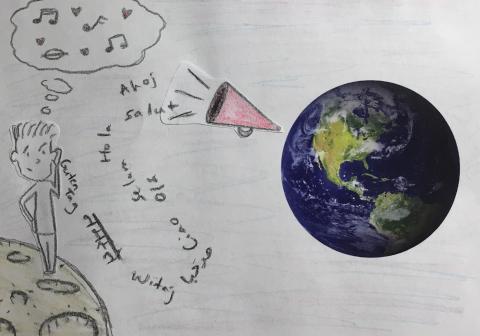February 23, 2016 - 00:25


Not being much of a visual artist myself, I didn’t come into my placement at the center with a particular passion for the art itself—though I was excited about what I knew art could add to a relationship in the way of communication, self-expression, and representation, I was still hesitant about my relationship to the form that the artists at the center center their life around. Each and every one has their own very developed style, and their personhood is expressed so clearly in each piece I have seen. This week, though, I had the opportunity to connect with one participant, Carl*, on music. While walking to the lab, I asked him if he could whistle—he did, and we whistled together for a while. When I asked if he knew how to beatbox, he surprised me by immediately breaking out some impressive vocal percussion skills. Later, another Bryn Mawr student informed me that Carl* was a great singer, and had helped record an album with other participants at the center. We listened to some tracks, and Carl* even sang me a part of “Amazing Grace” on the spot. There was something so unique and special about this experience for me—because my artistic passion lies in music, so much of the way that I come to understand those around me and their individuality is through their voices and how they use them. I learned so much about Carl* that day that could not be put into words or added into a dialogical conversation.
The moment really harkened back to Kuppers for me, and immediately deepened my reading. Quoting Iwana in her analysis of the performance art she experiences, Kuppers writes that one of the goals of the shared practice is “extricating the pure life which is dormant in our bodies” (Iwana, qtd. in Kuppers 115). The power of any kind of art to offer alternative communication pathways is astounding, but I didn’t realize the extent of these possibilities until the artistic language I have the most experience with—music—was spoken.

Comments
Thanks for this story. It
Submitted by alesnick on February 27, 2016 - 16:26 Permalink
Thanks for this story. It strikes me that your bid to whistle is what cracked this songline out! It is beautiful how one thing leads to the next: whistling to Amazing Grace to learning the recordning history of one of the artists. I'm intrigued by Kuppers' and your use of the term "extricate" in this connection: "to free someone or something from a constraint or difficuty:" release." So a direct connection to freedom, and power to enlarge it. I'm imagining another way of thinking about the story, too, that the pure life of Carl's, and your, music was/is neither dormant nor bound, but rather immanent. ?